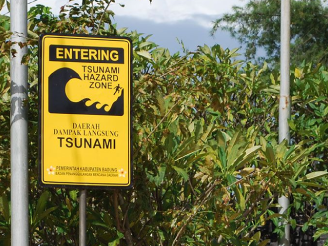
Tsunami warning sign
By Sophie Hares
From blowing conch shells to ringing church bells and sending mobile phone alerts, Caribbean countries are looking at high and low-tech ways to alert citizens to run for safety in the face of tsunamis which could wreak havoc on unprepared communities.
While devastating hurricanes grab the headlines each year, experts say tsunami risk is high in the region where countries need to put a greater emphasis on education and preparing coastal communities to be "Tsunami Ready" if they want to reduce losses.
"It is a real threat to the region. For a long time, it was called the forgotten danger," said Christa von Hillebrandt-Andrade, manager of the National Oceanic and Atmospheric Administration's (NOAA) Caribbean Tsunami Warning Program.
"If countries are not ready and people are not ready to respond, we could have hundreds of thousands of deaths."
Preparing to deal with deadly waves will be top of the agenda for World Tsunami Awareness Day on November 5, which will promote the "Sendai Seven Campaign" target of reducing disaster damage to critical infrastructure and disruption of basic services.
The last tsunami to hit the region was more than 70 years ago, when over 2,000 people died in the Dominican Republic and Haiti.
But experts say now the Caribbean, which has more than double the population and much of its infrastructure such as airports and tourist hotels in coastal areas, has more to lose.
While tsunamis might not top the long list of priorities for the cash-strapped Caribbean, considerable progress has been made with over 80 seismic and 100 sea-level monitoring stations from Bermuda to Brazil relaying data to the Pacific Tsunami Warning Center.
Around 60 communities in countries including Puerto Rico, Anguilla, Haiti and Guatemala are certified "Tsunami Ready", which means they have comprehensive hazard zone and evacuation maps, alert systems in place and undertake regular training and simulations.
It's also home to the Caribe Wave, the world's biggest annual tsunami drill which involves over 800,000 people from nearly 50 countries.
Haiti's second-city, Cap-Haitien, which is close to an undersea tectonic fault, is "Tsunami Ready" and more towns should be signed up this year in the country which is making tsunami preparation a priority, said the head of Haiti's civil protection.
"The tsunami risk is very high for the Caribbean and it's certainly even higher for a country like Haiti because of the social-economic situation. We're very vulnerable," said Jerry Chandler, Haiti's civil protection director.
Rolling out mobile phone alerts that can warn of approaching tsunamis as well as other hazards is now on the cards in Haiti, where mobile penetration is high, said Chandler.